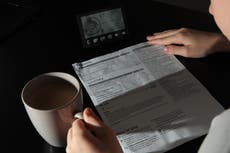Liz Truss expected to freeze energy bills at £2,500
Bill to taxpayer in subsidising energy suppliers’ extra wholesale costs estimated at £90bn
Liz Truss is planning to freeze all household energy bills at around £2,500 a year in one of her first acts as Britain’s new prime minister.
The new Tory party leader is expected to make a “major intervention” to cap Britons’ soaring gas and electricity bills as soon as Thursday, part of a package that could cost up to £90bn.
A government source confirmed that the freeze could see annual bills capped around the £2,500 mark – stopping the planned hike to over £3,500 from 1 October.
The £400 universal discount “handout” already committed for this autumn is set to be factored in to the freeze, so the energy price cap would effectively remain at its current level of £1,971.
The plan now being worked on by Treasury officials and Ms Truss’ senior team would see the government subsidising the extra cost of rising wholesale gas being bought by UK suppliers.
However, an insider in the Truss camp told The Independent that some of the crucial details have still to be worked out and nothing has been finalised yet.
Energy industry chiefs have said government-backed loans could be offered to suppliers to fund the price freeze, which could then be repaid through an extra levy on household bills once the crisis is over.
But government officials are understood to be looking at extra government borrowing and absorbing the huge costs into general taxation, rather than allowing companies to add to bills over time.
Ms Truss is said to be planning to bypass regulator Ofgem and impose the freeze on household energy bills for the next 18 months. Incoming chancellor Kwasi Kwarteng has already said support would help people “through this winter and the next”.
Allies of the new PM told The Times – which first reported of the plan to cap prices around £2,500 – suggested that it could cost up to £90m for an 18-month period.
Labour’s deputy leader Angela Rayner said it would be “completely unfair” for hard-pressed families to bear the brunt of any freeze at a later date, calling on the new PM to introduce an expanded windfall tax on the oil and gas giants.
Lib Dem leader Sir Ed Davey also called for a “genuine freeze” paid for through an expanded windfall tax – expressing his concern that Ms Truss appears to want to “make our children pick up the tab”.
Separately, Ms Truss is said to be preparing a £40bn scheme to cut businesses’ spiralling utility bills. Officials are considering either fixing a unit price that firms will pay, or making sure that suppliers offer a particular unit price reduction, according to Bloomberg.
The scheme for businesses would cost about £40bn if in place for six months, according to the government documents cited by the website. But it is not clear how long Ms Truss wants the government to subsidise wholesale gas costs.
Treasury minister Simon Clarke said Ms Truss’s plan to tackle energy bills will be a “major intervention” to help both businesses and households, but declined to share any details of a possible price freeze.
The senior Truss ally – tipped to be levelling up secretary – told BBC Radio 4’s Today programme it would address the current crisis and the “long-term interest to bill-payers”.
Paul Johnson, head of the respected Institute for Fiscal Studies (IFS), told The Times that the Truss plan for a cap is “a terrible policy – but maybe one we can’t avoid”.
“The problems with it are twofold. It’s enormously expensive and a lot of money goes to people who don’t need it, and [secondly] if you’re holding prices constant what takes the strain is supply, so that increases the risk that you’ll end up with shortages.”
Resolution Foundation chief Torsten Bell said capping prices could be “messy”, but would help control inflation and was necessary for social “solidarity” – warning that many families “will be getting poorer” even with such an intervention.
The think tank chief told MPs on the business and energy select committee on Tuesday that the Truss government would have to intervene in ways “that all of us thought would never be needed”.
Consumer champion Martin Lewis said freezing prices would “help substantially” this winter, saying in a blog post that he would “absolutely welcome” bills be kept close to current levels.
“The big benefit, and problem, of this is (almost) everyone gets it,” he said on the non-targeted scheme. Mr Lewis also warned against energy companies being able to “add a chunk to bills” once the worst of the crisis is over. “What if bills don’t drop – what happens then?”
Tina McKenzie, policy chief at Federation of Small Businesses (FSB), said desperate firms would welcome some form of cap from the government to limit firms’ rising energy bills.
She told MPs that many business owners’ energy contracts were coming to an end at October. Ms McKenzie said one pub in Tyne and Wear had seen energy bills shoot up from £32,000 to £135,000. “The question is, are they going to fold or are they going to get help?”
Ms Truss reportedly only wanted to extend the current discount for all households from £400 to £1,000 as recently as last week. She is said to have accepted this would not be enough to meet the scale of the crisis after discussions with officials.
Join our commenting forum
Join thought-provoking conversations, follow other Independent readers and see their replies
Comments



Bookmark popover
Removed from bookmarks